Update: See Don Easterbrooks ‘Cause of the pause”.
In the “settled science” department. It seems even Dr. Kevin Trenberth is now admitting to the cyclic influences of the AMO and PDO on global climate. Neither “carbon” nor “carbon dioxide” is mentioned in this article that cites Trenberth as saying: “The 1997 to ‘98 El Niño event was a trigger for the changes in the Pacific, and I think that’s very probably the beginning of the hiatus,”
This is significant, as it represents a coming to terms with “the pause” not only by Nature, but by Trenberth too. Excerpts:
....Now, as the global-warming hiatus enters its sixteenth year, scientists are at last making headway in the case of the missing heat. Some have pointed to the Sun, volcanoes and even pollution from China as potential culprits, but recent studies suggest that the oceans are key to explaining the anomaly. The latest suspect is the El Nino of 1997/98, which pumped prodigious quantities of heat out of the oceans and into the atmosphere - perhaps enough to tip the equatorial Pacific into a prolonged cold state that has suppressed global temperatures ever since.
“The 1997 to ‘98 El Nino event was a trigger for the changes in the Pacific, and I think that’s very probably the beginning of the hiatus,” says Kevin Trenberth, a climate scientist at the National Center for Atmospheric Research (NCAR) in Boulder, Colorado. According to this theory, the tropical Pacific should snap out of its prolonged cold spell in the coming years."Eventually," Trenberth says, “it will switch back in the other direction.”
-------
The simplest explanation for both the hiatus and the discrepancy in the models is natural variability. Much like the swings between warm and cold in day-to-day weather, chaotic climate fluctuations can knock global temperatures up or down from year to year and decade to decade. Records of past climate show some long-lasting global heatwaves and cold snaps, and climate models suggest that either of these can occur as the world warms under the influence of greenhouse gases.
--------
One important finding came in 2011, when a team of researchers at NCAR led by Gerald Meehl reported that inserting a PDO pattern into global climate models causes decade-scale breaks in global warming3. Ocean-temperature data from the recent hiatus reveal why: in a subsequent study, the NCAR researchers showed that more heat moved into the deep ocean after 1998, which helped to prevent the atmosphere from warming6. In a third paper, the group used computer models to document the flip side of the process: when the PDO switches to its positive phase, it heats up the surface ocean and atmosphere, helping to drive decades of rapid warming7.
See how we wrote about this in this PDF in 2007 and 2008, later enhanced and published after peer review by Elsevier in Evidence Based Climate Change.
------------------------
Game Finally Up for Carboncrats
It was promoted as the voyage to study the melting of ice sheets in the South Pole as well as to retrace Douglas Mawson’s perilous expedition a century ago. Yet the Australasian Antarctic Expedition, led by UNSW climatologist Chris Turney, has become a comedy goldmine. The climate-change Cassandras are increasingly marginalised here and abroad.
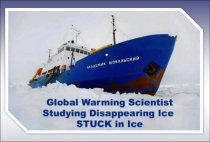
In case you missed the story during your Christmas break, the researchers became trapped in ice so thick that Chinese rescue attempts could not reach the frozen ship. “It fell to Professor Turney’s ship to play the role of our generation’s Titanic,” Canadian satirist Mark Steyn noted. “Unlike the original, this time round the chaps in the first-class staterooms were rooting for the iceberg.”
And Parish-based writer Anne Jolis quipped: “Maybe the climate-change researchers even raised a glass, if they had any liquor left. They certainly had enough ice.” Humour aside, events such as this indicate dark days for green enthusiasts.
Tony Abbott’s likely repeal of the unpopular carbon tax this year reflects a global trend: the anti-carbon agenda is being subjected to the most intense scrutiny, and is found wanting.
The Kyoto treaty effectively expired a year ago. Prospects for a replacement are virtually zero. Rich nations are rejecting climate compensation for the developing world. Europe is in a coal frenzy. Germany, a former green trend-setter, is slashing unaffordable subsidies to the renewables industry. The European Parliament is losing confidence in the EU emissions trading scheme. No Asian nation has an emission trading scheme in operation. China’s and India’s net emissions are growing dramatically and governments, most recently Japan’s, are abandoning earlier pledges to reduce their nations’ carbon footprints. Even US Democrats, notwithstanding President Obama’s direct action-style energy plan, won’t pass modest carbon-pricing bills in the Congress. Add to this those debunked predictions (remember the vanishing Himalayan glaciers, disappearing North Polar ice cap?), and it is clear that Tim Flannery’s moment has come and gone.
Meanwhile, 2013 marked the 15th year of flat-lined global surface temperatures, despite record levels of carbon dioxide being pumped into the atmosphere since 1998. And as the US shale “fracking” revolution shows, the most efficient way to cut emissions is not via command-and-control regulation but by allowing private drillers to expand natural gas production.
Of course, the environmental doomsayers remain apocalyptic. You try going on the ABC’s Q&A and raise doubts about global-warming alarmism. You will still see the inner-city studio audience treating you not merely with hostility but with open-mouthed incredulity.
The climate-change Cassandras are increasingly marginalised here and abroad.
When they abuse, intimidate and victimise anyone with the temerity to criticise the fanaticism of their movement, the inclination of ordinary Australians is either to shrug their shoulders with a profound lack of interest or to grimace at this moral grandstanding. Historians will probably look back at the years 2006-09 as the time when the climate hysteria reached its peak in Australia, when rational debate was at its most restricted and politicians at their most gullible.
These were the days of drought, unseasonal bushfires, An Inconvenient Truth, the Garnaut Report and, of course, Kevin Rudd’s “greatest moral challenge”. Crikey, even Rupert Murdoch was “giving the planet the benefit of doubt”.
Contrary to media stereotypes, many so-called sceptics - such as Abbott, John Howard, Maurice Newman and this writer - recognised that the rise in carbon dioxide as a result of the burning of fossil fuels led to moderate warming.
But because we questioned the doomsday scenarios and radical, costly government-directed plans to decarbonise the economy, we were denounced as “deniers”. Those days are over.
Thanks to Abbott’s forceful critique of Labor’s ETS/carbon tax, and the persistent failure of the carboncrats to reach legally binding global agreements, Australians have risen up against this madness.
At last, there is recognition not just that there are at least two sides to every story, but that when sophisticates seek to shut down debate, it amounts to an attack on the public interest. That is why the anti-carbon zealots have become so defensive. The game is up.
The idea of climate mitigation - carbon taxes, cap and trade, channelling taxpayer subsidies to wind and solar power - destroyed the leaderships not only of Malcolm Turnbull in 2009 and Rudd in 2010, but also of Julia Gillard and Rudd (again) last year.
And although the Coalition’s approval ratings have declined since the election, polls also show that opposition to the carbon tax remains high.
Last year’s Lowy Institute survey said that only 40 per cent (down from nearly 70 per cent in 2006) think climate change is serious and requires action. And yet, despite this changing (political) climate, Opposition leader Bill Shorten still opposes the repeal of the carbon tax.
If Labor’s divorce from the Greens is genuine, he should support the PM;s legislation, lest he meet the same fate as his fellow deniers and become a laughing stock.
Tom Switzer is editor of The Spectator Australia.
Joseph D’Aleo, CCM, Hudson Litchfield News
It is perfectly reasonable to be green minded and work towards conservation of our resources and clean air and water. But CO2 has been incorrectly blamed for the natural cycles of
temperatures and weather extremes of drought, flood, hurricanes, tornadoes, heat and cold.
Instead of a health hazard, CO2 is plant food and has helped greatly improve global crop yields and feed the increasing population. Thanks to improved hybrids and farming practices and increased CO2, a 50-year trend of remarkable growth in world grain production has followed. Since 1960, global wheat and rice production has tripled, and corn production is almost five times higher.
CO2’s claimed effect on climate has been falsified. Global warming has stopped for 17 years (0.9F cooling here in the northeast in winters during that period) even as CO2 has risen 11%. In Europe, the green agenda has led to great increases in the cost of energy as the winters turned sharply colder. In the last decade 280,000 Brits have died from the cold and just 10,000 from summer heat.
In the United States, the number of heat records have been declining since the 1930s. 23 of the 50 state all time heat records occurred in the 1930s and 39 before 1960. More cold than heat records have been set since the 1940s. The claims about high ranking months and years is with ‘adjusted’ (manipulated) data. The heat and cold records are unadjusted. The tropical heat build-up in the atmosphere and oceans, one of the key outputs in ALL the climate models is not seen in the weather balloon of satellite data or the dense ocean buoys we use to track El Nino and La Ninas down to 300 meters depth the last 3 to 5 decades.
Sea level rise has slowed dramatically from the 20th century, and there is no upward trend in drought and flood. Hurricane activity globally is at a 34 year low. Sandy was a borderline Category 1 storm. Eight Category 3 or higher hit the Atlantic coast from 1938 to 1960. The total tornado count this year was over 140 fewer than any year since records started in the 1950s. The number of wildfires are the lowest since modern records began in 1985.
The arctic icecover bounced back over 50% with the one of the coldest arctic summers on record while new records for ice were set in Antarctica, even trapping a research ship this month, summer in Antarctica. Snow was supposed to become rare. 4 of the top 5 snowiest years for the northern hemisphere have been in the last 6 years and we have had more east coast snowstorms this decade than any in history just 4 years in.
The great physicist Richard Feynman said not matter how smart you are, who you are, how beautiful your theory, if data doesn’t support your theory, it is wrong. Einstein noted a model or a hypothesis cannot “prove” anything. But data can invalidate a hypothesis or model. Einstein described the “Key” to science well when he said: “The case is never closed.” “Many experiments may prove me right but it takes only one to prove me wrong.”
In the case of global warming we have many examples proving it wrong, but with the political motivation of heavy funding exceeding $79B the last decade, they are ignored with claims of a consensus. Dr. Michael Crichton wrote “Historically the claim of consensus has been the first refuge of scoundrels; it is a way to avoid debate by claiming the matter is settled.”
The great physicist Richard Feynman said not matter how smart you are, who you are, how beautiful your theory, if data doesn’t support your theory, it is wrong. Einstein noted a model or a hypothesis cannot “prove” anything. But data can invalidate a hypothesis or model. Einstein described the “Key” to science well when he said: “The case is never closed.” “Many experiments may prove me right but it takes only one to prove me wrong.”
In the case of global warming we have many examples proving it wrong, but with the political motivation of heavy funding exceeding $79B the last decade, they are ignored with claims of a consensus. Dr. Michael Crichton wrote “Historically the claim of consensus has been the first refuge of scoundrels; it is a way to avoid debate by claiming the matter is settled.” By claiming both sides of every weather extreme, they have created an unfalsifiable hypothesis. They want you to believe every weather event proves that we are responsible.
The public and scientists in Europe have become unsettled. In Europe had 5 straight brutally cold winters and scientists are said to be “baffled” that their models have failed them. The UK Prime Minister David Cameron has ordered ministers to ditch the ‘green crap’ blamed for driving up energy bills and making business uncompetitive. In Germany 600,000 homes had their electricity turned off during the last brutal winter as electricity prices skyrocketed, and the country is rushing to build 10 coal fired plants to lower costs. In the UK 12 million people are said to be in fuel poverty, having to choose between heating and eating. If we follow Kuster (D-NH) etal’s RES plan, we would lose would lose 1 million jobs by 2020 and average families will pay $2,400 more per year for electricity (Kreutzer, 2010).
Why would the governments of the world go down this path? To save the planet?
UN climate official Ottmar Edenhofer in November 2010 admitted “one has to free oneself from the illusion that international climate policy is environmental policy.” Instead, climate change policy is about how “we redistribute de facto the world’s wealth...”
By Matt Pearce, Time Magazine
January 6, 2014, 1:33 p.m.
As of Monday afternoon, the Midwest was battling uncommonly frigid weather that threatened to break some all-time-low temperature records. January is typically cold, but not this cold, with several Midwestern cities such as Chicago gripped by daytime temperatures well below zero.
So what’s happening?
A huge mass of arctic air has slipped away from the North Pole, settled over the U.S. and made everything really, really cold, meteorologists told The Times. You may know the phenomenon by a phrase you’ve seen in headlines lately: the ominous-sounding “polar vortex.”
“It’s not really a phrase I like—it makes it sound a lot worse than what it actually is,” said Todd Heitkamp, a warning coordination meteorologist for the National Weather Service in Souix Falls, S.D. “This has happened before.” Most recently in the 1990s, he said.
What is a polar vortex?
Ryan Maue, a Florida-based meteorologist for the private weather service WeatherBELL (where he partners with Joe Bastardi and Joe D’Aleo), described it as a “lobe” of dense, cold air that’s normally bound in by a jet stream; this one detached from over the North Pole and brought a whole lot of wind with it.
“The polar vortex isn’t this entity like a hurricane or nor’easter that develops and goes away. It’s a normal feature that’s part of the polar climate,” Maue told The Times.
Over the North Pole, Maue explained, cold air typically forms at night where clear skies allows heat to escape into space.
“Day after day after day, these pools of air form” near the pole, Maue said. ‘There’s always cold air up there, if the Arctic is left to its own devices.”
And, because of a “multitude of factors,” Maue said, a mass broke south and headed toward the U.S..
ICECAP/Weatherbell NOTE: The key this year is a warm pool of water that was northwest of Hawaii the last few years moving into the Gulf of Alaska. It helped to deflect the jet stream north and pick up Siberian air and join it with frigid Canadian arctic air and form a vortex that settled south.
The lower 48 states, when averaged out, reached a low of 13.8 degrees overnight Monday, according to calculations by Ryan Maue of Weather Bell Analytics. An estimated 190 million people in the U.S. were subjected to the polar vortex’s icy blast.
Images from weatherbell.com
The National Weather Service’s Heitkamp likened the effect to a large mass of cold building up over the North Pole and getting “flushed” south.
“The jetstream just shifts enough,” Heitkamp said, and a high-pressure front “just moves in over the upper Midwest, and it just sits in place, and it allows the cold air to spread over the entire upper Midwest.”
Wind has accompanied the cold: On Monday morning, the National Weather Service forecast wind chills of more than 30 degrees below zero to sweep an area as far west as Montana, as far east as New York and as far south as Missouri.
Why is this all so dangerous?
At those temperatures, Heitkamp warned, exposed flesh can freeze in five minutes, and some vehicles may not start.
“If a person isn’t dressed properly, and they don’t have a winter survival kit in their vehicle, and if they aren’t prepared, they’ll have to deal with the consequences thereafter,” Heitkamp said. “We have a lot of vehicles right now that are not starting.”
While those kind of precautions may be familiar to upper Midwesterners, they may come as a surprise to Americans used to warmer Januaries.
“It affects people that aren’t used to cold right now. I’m in Florida right now, and they’re issuing a wind chill advisory because it’s going to go below freezing,” said Maue, speaking by phone from Tallahassee and calling it a once-in-a-decade event.
When will it be over?
The polar mass is expected to warm slightly as it moves over the East Coast by Monday night, before finally blowing out to sea.
“It’s like flipping the switch and we’re back to more mild conditions for January,” Maue said.
Heitkamp added, “We’re just telling people to minimize their time outdoors, pay attention to the forecast, and this too shall pass.”
Icecap Note: After a couple more cold days, moderation will take place but note that winter when the cold does this, it often repeats and models indicate it may after 10 days, probably extending a little further east.
Join us at weatherbell.com and read about the threat. We correctly forecast this cold winter and this outbreak many days in advance.



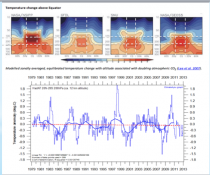
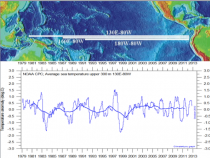
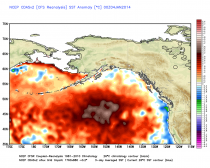
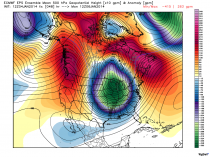
_thumb.png)